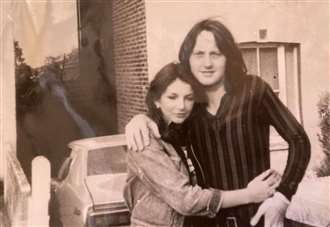Forty years ago today, one man had the privilege of travelling with a megastar for one of the biggest global events.
Radio 1 broadcaster Steve Blacknell flew on Concorde with Phil Collins as the singer jetted from the London show for Live Aid to the Philadelphia one in the USA, on Saturday, July 13, 1985.

Collins was the only artist to perform in both concerts.
Mr Blacknell, who is now 72 and lives in Hythe, told KentOnline: “I asked Phil why he was doing this and he said, ‘Why not?’ I think for him it was like conquering Everest, because it was there.
“I don’t think there was any master plan; he just fancied it.
“For anyone to do a gig in front of all those people at Wembley is one thing, but it takes a bit of a superhero to actually go across the Atlantic and do it again.
”This was such a big, historic day and Phil seemed to be taking it in his stride.”

Live Aid was a double charity concert – at Wembley Stadium and the John F. Kennedy Stadium. It was transmitted worldwide and raised millions of pounds for people starving in a famine in Ethiopia.
Collins finished his set in London by 3.50pm and was flown from Wembley to Heathrow Airport by DJ Noel Edmonds, a licensed helicopter pilot.
By exactly 7.38pm (12.38am British time) Collins was at the JFK Stadium drumming for Eric Clapton’s set. After that he sang solo for two of his songs and then went straight back behind the drum kit for Led Zeppelin. He ended up on stage for an hour.
Mr Blacknell, who grew up in Dartford and dated singer Kate Bush in the mid-1970s, had met Collins on the tarmac at Heathrow. They took off on the supersonic plane which was capable of crossing the Atlantic in just under three hours, breaking the sound barrier.
Within those hours, he carried out a mid-flight interview and was able to get to know Collins, who had become an extraordinarily successful solo star in recent years.

Speaking to KentOnline ahead of the anniversary of Live Aid, Mr Blacknell said: “He was a very warm man and down to earth. I think all pop stars should be down to earth because we make them and, after all, they’re only human beings.
“But he was, and still is, an exceptionally lovely man and great fun to be with.
“We found we were both fans of the comedian Tony Hancock so we ended up talking about him and quoting his lines.
“The co-pilot invited us to look in the cockpit. The moment we were flying over Wales, Queen were onstage at Wembley.
“It only really hit me when I got back to London the following day, what we’d done or really what Bob Geldof had done. We were just part of it.

“He and Midge Ure (the organisers) did a great job. It is in history and will remain one of the greatest rock and roll events.”
This episode is brought up in Mr Blacknell’s new autobiography, Tales from the Bedroom Wall.
In it he comments: “There were, as always, a few dissenters who thought Phil had been showing off doing the double bubble.
“But by and large the mission was being hailed as a global treat and that he’d pulled off something special.”
Mr Blacknell was a Radio 1 DJ from 1983 to 1986.

In the mid-1970s he was the boyfriend of a then-teenage Kate Bush who was from nearby East Wickham in Bexley.
Mr Blacknell describes their initial meeting and courtship but wrote: “I had no real idea that I was dealing with a real top-to-toe musical genius.
“I was and indeed still feel so proud to have known the gentle genius that continues to enthral the planet.”
He describes how she played him early demos of her music, including The Saxophone Song, which later appeared on her first album The Kick Inside.
She also gave him an acetate of Wuthering Heights, her debut single, which went to number one in 1978.
The relationship fizzled out as she became busier with her developing career.
Tales from the Bedroom Wall, The Life and Times of a Serial Thrill Seeker, by Steve Blacknell, is published by Old Treacle Press Ltd. It is on sale via Amazon.
My memories of Live Aid, by reporter Sam Lennon
Live Aid was part of Geldof and Ure’s campaign to feed people in a two-year famine in Ethiopia that began in 1983.
It affected a fifth of the population there and ended up causing 1.2 million deaths.

With the time zones, the two concerts overlapped but led to a total of 16 hours of continuous live music.
Globally, 1.5 billion people watched the show, most on television, but the figure also includes the 72,000 people attending Wembley and the 89,000 people at JFK Stadium.
The concert was the most ambitious international satellite television venture that had ever been tried at the time. In Britain, it was broadcast live on BBC TV and Radio 1.
I was living in north London then and noticed the streets on that hot, sunny day deserted because of so many people indoors, glued to their sets.
I watched the beginning of the show at noon at Wembley.

In the afternoon, I went out on a motorbike ride with a friend to St Albans, came back and stayed up bleary-eyed to watch the finale in America, until 4am British time.
This was the multi-star performance of the song We Are the World.
I recorded parts of the show with the cutting-edge technology available to most in 1985: video and audio cassettes.
